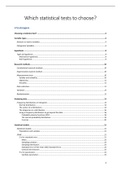Romanian orphan studies: Institutionalisation
Researchers followed 165 Romanian orphans who experienced poor conditions in Romania and were
then adopted in the UK. The study was a longitudinal one, measuring whether good care can make
up for early bad experiences in institutions. Physical, cognitive and emotional development were
assessed at various points through childhood and early adulthood. There was also a control group of
52 adopted children from the UK. The study found that half of the orphans showed delayed
intellectual development when they came to the UK. The recovery rates related to how long they
were in the Romanian orphanage. Those who were adopted after 6 months had a better IQ than
those adopted after 2 years. The differences continued to be apparent at 16 years old. Lots of the
Romanian children had disinhibited attachment, which is when they were clingy and attention-
seeking, and had indiscriminate affection towards strangers. This was only shown in children
adopted after 6 months old. This research supports Bowlby's theory about a critical period of
attachment, and this showed to have long-lasting effects.
Other researchers carried out the strange situation to assess the type of attachment in Romanian
children, aged 12-31 months, who had spent most of their life in institutionalised care. Their data
was compared to a control group of 50 children who had never experienced institutionalised care.
19% of the experimental group were securely attached, compared to 74% of the control. 44% of the
institutionalised group displayed disinhibited attachment. The effects of institutionalisation caused
children to be equally affectionate to familiar and unfamiliar people. This might be because they
have had to adapt to having multiple caregivers. Children also displayed delayed intellectual
development but weren't as pronounced if the babies were adopted before 6 months old.
A strength of the Romanian orphans is that there is real-world application. This study has changed
the ways that children are treated in institutions. Child homes avoid having numerous caregivers for
one child. Instead, each child will be cared for by one of two care workers. This allows children to
have a better chance of developing normal attachments.
Another strength is that there are fewer confounding variables than in other research. Many of the
adopted children studied before the Romanian orphans had come from families of neglect and
bereavement. This means that it's difficult to measure the effects of the institution alone, as children
were affected by multiple factors. This means we can be pretty sure that the differences in
institutionally cared for children are the result of this type of care, which gives the study high
internal validity.
However, a counterpoint is that the Romanian orphan studies might have new confounding
variables because the quality of care was so bad. This makes it harder to separate the effects of
institutional care from the effects of bad institutional care. This means that there might be less
internal validity than we thought.
A limitation is that there is a lack of data on adult development. Although there is lots of info about
how institutionalisation affects child development, there isn't much about adults. We only have data
up to the participants' the early 20s. This means that it will take time to get more information about
long-term damage, and the most important information is yet to come.
Researchers followed 165 Romanian orphans who experienced poor conditions in Romania and were
then adopted in the UK. The study was a longitudinal one, measuring whether good care can make
up for early bad experiences in institutions. Physical, cognitive and emotional development were
assessed at various points through childhood and early adulthood. There was also a control group of
52 adopted children from the UK. The study found that half of the orphans showed delayed
intellectual development when they came to the UK. The recovery rates related to how long they
were in the Romanian orphanage. Those who were adopted after 6 months had a better IQ than
those adopted after 2 years. The differences continued to be apparent at 16 years old. Lots of the
Romanian children had disinhibited attachment, which is when they were clingy and attention-
seeking, and had indiscriminate affection towards strangers. This was only shown in children
adopted after 6 months old. This research supports Bowlby's theory about a critical period of
attachment, and this showed to have long-lasting effects.
Other researchers carried out the strange situation to assess the type of attachment in Romanian
children, aged 12-31 months, who had spent most of their life in institutionalised care. Their data
was compared to a control group of 50 children who had never experienced institutionalised care.
19% of the experimental group were securely attached, compared to 74% of the control. 44% of the
institutionalised group displayed disinhibited attachment. The effects of institutionalisation caused
children to be equally affectionate to familiar and unfamiliar people. This might be because they
have had to adapt to having multiple caregivers. Children also displayed delayed intellectual
development but weren't as pronounced if the babies were adopted before 6 months old.
A strength of the Romanian orphans is that there is real-world application. This study has changed
the ways that children are treated in institutions. Child homes avoid having numerous caregivers for
one child. Instead, each child will be cared for by one of two care workers. This allows children to
have a better chance of developing normal attachments.
Another strength is that there are fewer confounding variables than in other research. Many of the
adopted children studied before the Romanian orphans had come from families of neglect and
bereavement. This means that it's difficult to measure the effects of the institution alone, as children
were affected by multiple factors. This means we can be pretty sure that the differences in
institutionally cared for children are the result of this type of care, which gives the study high
internal validity.
However, a counterpoint is that the Romanian orphan studies might have new confounding
variables because the quality of care was so bad. This makes it harder to separate the effects of
institutional care from the effects of bad institutional care. This means that there might be less
internal validity than we thought.
A limitation is that there is a lack of data on adult development. Although there is lots of info about
how institutionalisation affects child development, there isn't much about adults. We only have data
up to the participants' the early 20s. This means that it will take time to get more information about
long-term damage, and the most important information is yet to come.



